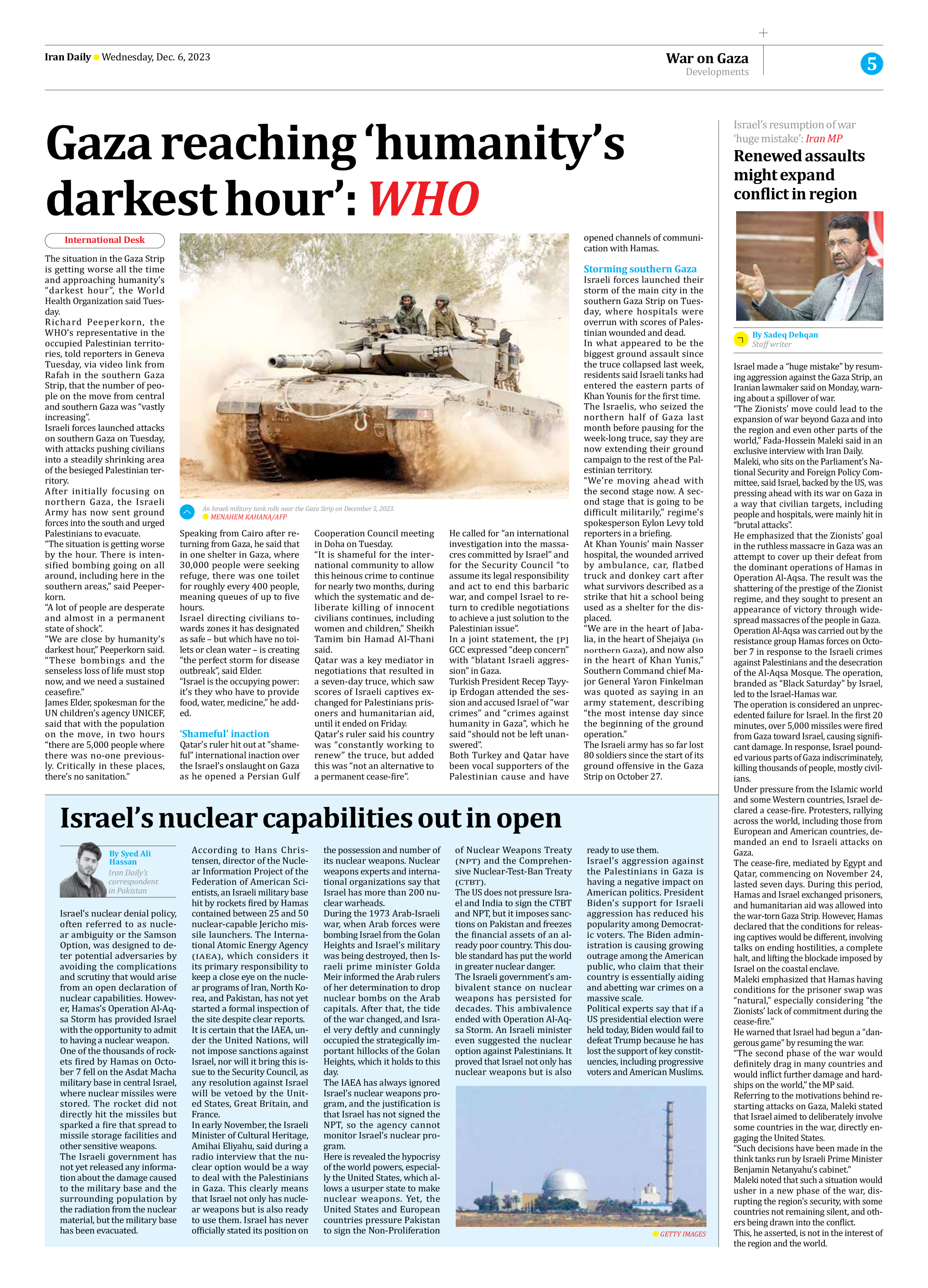
Gaza reaching ‘humanity’s darkest hour’: WHO
The situation in the Gaza Strip is getting worse all the time and approaching humanity’s “darkest hour”, the World Health Organization said Tuesday.
Richard Peeperkorn, the WHO’s representative in the occupied Palestinian territories, told reporters in Geneva Tuesday, via video link from Rafah in the southern Gaza Strip, that the number of people on the move from central and southern Gaza was “vastly increasing”.
Israeli forces launched attacks on southern Gaza on Tuesday, with attacks pushing civilians into a steadily shrinking area of the besieged Palestinian territory.
After initially focusing on northern Gaza, the Israeli Army has now sent ground forces into the south and urged Palestinians to evacuate.
“The situation is getting worse by the hour. There is intensified bombing going on all around, including here in the southern areas,” said Peeperkorn.
“A lot of people are desperate and almost in a permanent state of shock”.
“We are close by humanity’s darkest hour,” Peeperkorn said.
“These bombings and the senseless loss of life must stop now, and we need a sustained ceasefire.”
James Elder, spokesman for the UN children’s agency UNICEF, said that with the population on the move, in two hours “there are 5,000 people where there was no-one previously. Critically in these places, there’s no sanitation.”
Speaking from Cairo after returning from Gaza, he said that in one shelter in Gaza, where 30,000 people were seeking refuge, there was one toilet for roughly every 400 people, meaning queues of up to five hours.
Israel directing civilians towards zones it has designated as safe – but which have no toilets or clean water – is creating “the perfect storm for disease outbreak”, said Elder.
“Israel is the occupying power: it’s they who have to provide food, water, medicine,” he added.
‘Shameful’ inaction
Qatar’s ruler hit out at “shameful” international inaction over the Israel’s onslaught on Gaza as he opened a Persian Gulf Cooperation Council meeting in Doha on Tuesday.
“It is shameful for the international community to allow this heinous crime to continue for nearly two months, during which the systematic and deliberate killing of innocent civilians continues, including women and children,” Sheikh Tamim bin Hamad Al-Thani said.
Qatar was a key mediator in negotiations that resulted in a seven-day truce, which saw scores of Israeli captives exchanged for Palestinians prisoners and humanitarian aid, until it ended on Friday.
Qatar’s ruler said his country was “constantly working to renew” the truce, but added this was “not an alternative to a permanent cease-fire”.
He called for “an international investigation into the massacres committed by Israel” and for the Security Council “to assume its legal responsibility and act to end this barbaric war, and compel Israel to return to credible negotiations to achieve a just solution to the Palestinian issue”.
In a joint statement, the [P] GCC expressed “deep concern” with “blatant Israeli aggression” in Gaza.
Turkish President Recep Tayyip Erdogan attended the session and accused Israel of “war crimes” and “crimes against humanity in Gaza”, which he said “should not be left unanswered”.
Both Turkey and Qatar have been vocal supporters of the Palestinian cause and have opened channels of communication with Hamas.
Storming southern Gaza
Israeli forces launched their storm of the main city in the southern Gaza Strip on Tuesday, where hospitals were overrun with scores of Palestinian wounded and dead.
In what appeared to be the biggest ground assault since the truce collapsed last week, residents said Israeli tanks had entered the eastern parts of Khan Younis for the first time.
The Israelis, who seized the northern half of Gaza last month before pausing for the week-long truce, say they are now extending their ground campaign to the rest of the Palestinian territory.
“We’re moving ahead with the second stage now. A second stage that is going to be difficult militarily,” regime’s spokesperson Eylon Levy told reporters in a briefing.
At Khan Younis’ main Nasser hospital, the wounded arrived by ambulance, car, flatbed truck and donkey cart after what survivors described as a strike that hit a school being used as a shelter for the displaced.
“We are in the heart of Jabalia, in the heart of Shejaiya (in northern Gaza), and now also in the heart of Khan Yunis,” Southern Command chief Major General Yaron Finkelman was quoted as saying in an army statement, describing “the most intense day since the beginning of the ground operation.”
The Israeli army has so far lost 80 soldiers since the start of its ground offensive in the Gaza Strip on October 27.







